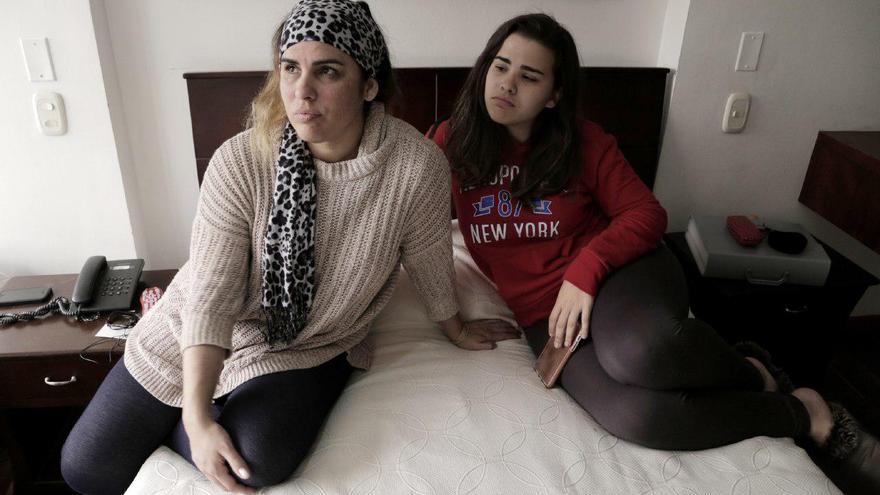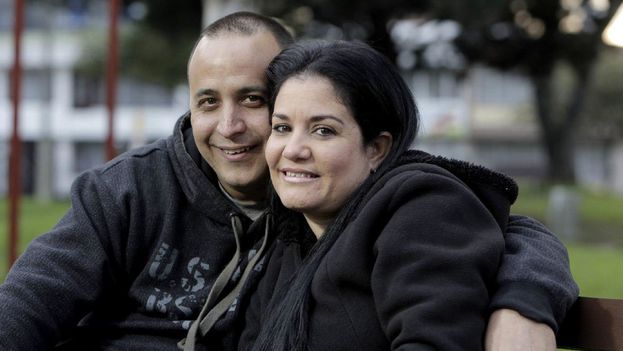
![]() 14ymedio, Mario J. Pentón, 7 March 2018 — The sound of a phone call broke into the monologue of Maydelin Alfonso Vázquez in the lobby of the Montecarlo hotel, about six blocks from the US embassy in Bogotá. Some of the Cubans staying there, waiting to get an immigrant visa to the United States, listened to the litany of difficulties to complete the procedures.
14ymedio, Mario J. Pentón, 7 March 2018 — The sound of a phone call broke into the monologue of Maydelin Alfonso Vázquez in the lobby of the Montecarlo hotel, about six blocks from the US embassy in Bogotá. Some of the Cubans staying there, waiting to get an immigrant visa to the United States, listened to the litany of difficulties to complete the procedures.
“Why am I shouting? I just can’t do it anymore, I’m going crazy with this,” she says in a dramatic tone and begins to sob. Alfonso “moved heaven and earth” to get the visa to travel to Colombia in Havana. She has barely two days left of the 20 that Bogota authorizes for her stay in this country but has not completed the paperwork to meet her daughter in Miami, from whom she has been separated for eight years.
“All this has been an ordeal from the time I was told in Cuba that I should apply for a visa in Colombia until I arrived here,” says Alfonso. The lack of information about the visa process in Colombia, the expensive procedures and the tensions to travel to a third country have made the process of reunification even more difficult for many Cuban families.
After announcing that more than two dozen of its officials had been victims of acoustic attacks of unknown origin, the US State Department evacuated non-essential personnel from its embassy in Havana and suspended the delivery of visas from that office. Weeks later it announced that it would process immigrant visas through its embassy in Bogotá.
“After the announcement from the United States, everyone went to the Colombian embassy in Havana, but there was no organization,” says Alfonso. The woman from Santa Clara insists that she had to go to Havana five times to process her visa to Colombia, which she only managed three days before traveling.
“What we have gone through has been very hard, more than 300 people endured an intense downpour in front of the Colombian embassy in Havana, with no place to protect us. Thanks to a lady who carried an umbrella and protected my papers I did not lose everything,” she says.
To travel to Colombia, Cubans residing on the island must present the invitation from the National Visa Center of the United States for the interview in Bogota. They are also required to have a passport-sized photo, and a photocopy of the main page of their travel document, a round-trip air ticket with a limit of 20 days that includes the stay for 10 days before and after the appointment.
Finally, Colombia requires, in order to demonstrate economic solvency, the presentation of bank account holdings for the value of 2,000 dollars or a notarized letter from the economic guarantor of the trip in the Colombian consulate in the country where they are located.

At the end of January, the Colombian embassy in Havana had delivered more than 1,100 visas to Cubans, according to statistics provided by the Colombian Ministry of Foreign Affairs to 14ymedio. Of these, almost 900 were intended for people who needed to be interviewed in Bogotá. However, the Colombian foreign minister stopped helping Cubans seeking to travel between March 2 and 12 due to legislative elections and consultations between parties in Colombia. The authorities have asked the migrants to register for their consular appointment at the US embassy in Bogotá.
“Getting here has been an ordeal,” says Lisset López Rodríguez, a 38-year-old Cuban singer who lives in Miami, and who has spent four years trying to reunite with her youngest daughter, Camila Guzmán. “The day I heard that they had canceled the procedures at the US Embassy in Cuba, I went crazy because I thought Camila was going to stay there,” she says.
Like most Cubans, Lopez learned of the decision of the United States to process visas in Bogotá through the news and had never traveled to Colombia. “I went to the Colombian consulate in Miami and they did not want to help me, I had to go back for several days and after a lot of paperwork they approved my tourist visa to accompany my daughter,” she explains.
In her opinion, throughout this process, information and transparency have been lacking. “Nobody guides you on what you have to do or helps you to make the procedures simpler, not to mention the costs,” laments López, in the absence of associations that advise for free.
“The appointment is given approximately one month in advance, you have to pay the passage to Colombia for you and your family member, including the return to Cuba, which is a ticket that is wasted if you already have an American visa. In addition, you have to pay in advance for accommodation in Bogota for 20 days, and for food and transfers, which must be done by taxi,” explains López. Along with these logistical expenses you must also pay for the medical exam which costs 220 dollars.
In total, Lopez and her daughter spent more than $6,000 on the entire process. “I never thought I would have to go to Colombia, nor spend this amount of money, but a mother’s love can do everything, at least now I’ll be with my daughter,” she says through tears.
For this Havanan, the decision of the United States to process visas in Colombia has been unfair to those residing on the island. López does not question the arguments of the State Department, but compares the current situation between the two countries with what happened during most of the Cold War. “Before there was no embassy, but the US had a consular section to help people get out to freedom, but now they don’t have even that,” she adds.
The State Department told this newspaper that they chose Bogota as the site to process visas for immigrants from Cuba because it is one of the largest embassies in Latin America. The area where it is located, in the neighborhood of Quinta Paredes, is a middle class nucleus in the Colombian capital.
“There are a lot of Cubans around here,” says Henry Caicedo, owner of a food-service business in the vicinity of the US embassy. The merchant affirms that the massive arrival of Cubans has favored local commerce. “Thanks to the Cubans, my place is full of people who are looking for good and cheap food,” he adds.
The Monte Carlo hotel and the Ambassador are mostly occupied by Cubans. The same thing happens with a good share of the establishments in the area. “This neighborhood has grown thanks to the people who come to do their paperwork at the American Embassy,” explains Luis Carlos Mogollón, an ex-military man who has become a taxi driver. “Ten years ago there were only three hotels, today you find more than one on every block,” he says.
The price of one night in a Quinta Paredes hotel usually ranges between 40 and 80 dollars. Most of the establishments offer a transport service for the procedures related to the American Embassy.
Some Bogota entrepreneurs have taken the opportunity to create travel packages. For example the Santa Cruz hotel offers: “American Visa Plan for the Cuban Community.” This hotel provides accommodation, transportation and advice for 10 days for 820 dollars.
“The attention has been good here,” Yackmart Domínguez says about the hotel service.
“Having to travel to Bogotá to do the procedures so that my family meets me in Miami has been difficult, all the money I had saved to get them established [in the US] has gone to in the passages and the stay in Colombia,” says this 38-year-old Cuban.
His wife, Malena Fernandez, who for the first time left Cuba to travel to Colombia, said she felt “shocked.” “It has been four years of pain, sadness, anguish and separation, and when I knew that I would have to postpone the interview because it would not be done in Havana, I felt like the world was falling down around me,” she adds.
Fernandez believes that the costs of the political struggle between the United States and Cuba are once again borne by families on both sides of the Florida Straits.
“If I have to go to the ends of the earth to be with my loved ones I would do it, no money can pay the value of a family,” she adds.
___________________
The 14ymedio team is committed to serious journalism that reflects the reality of deep Cuba. Thank you for joining us on this long road. We invite you to continue supporting us, but this time by becoming a member of 14ymedio. Together we can continue to transform journalism in Cuba.
